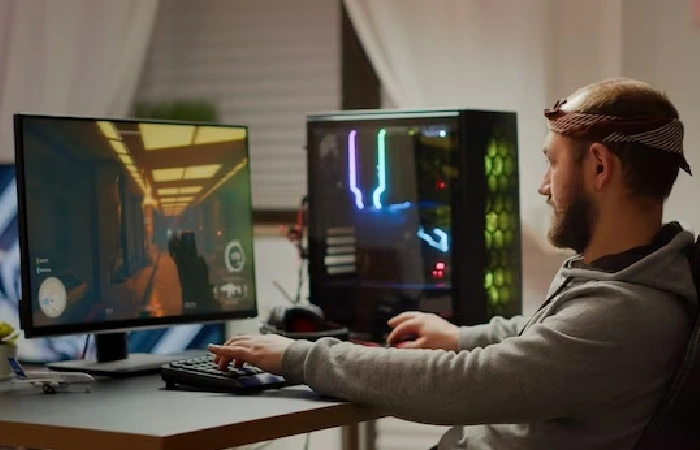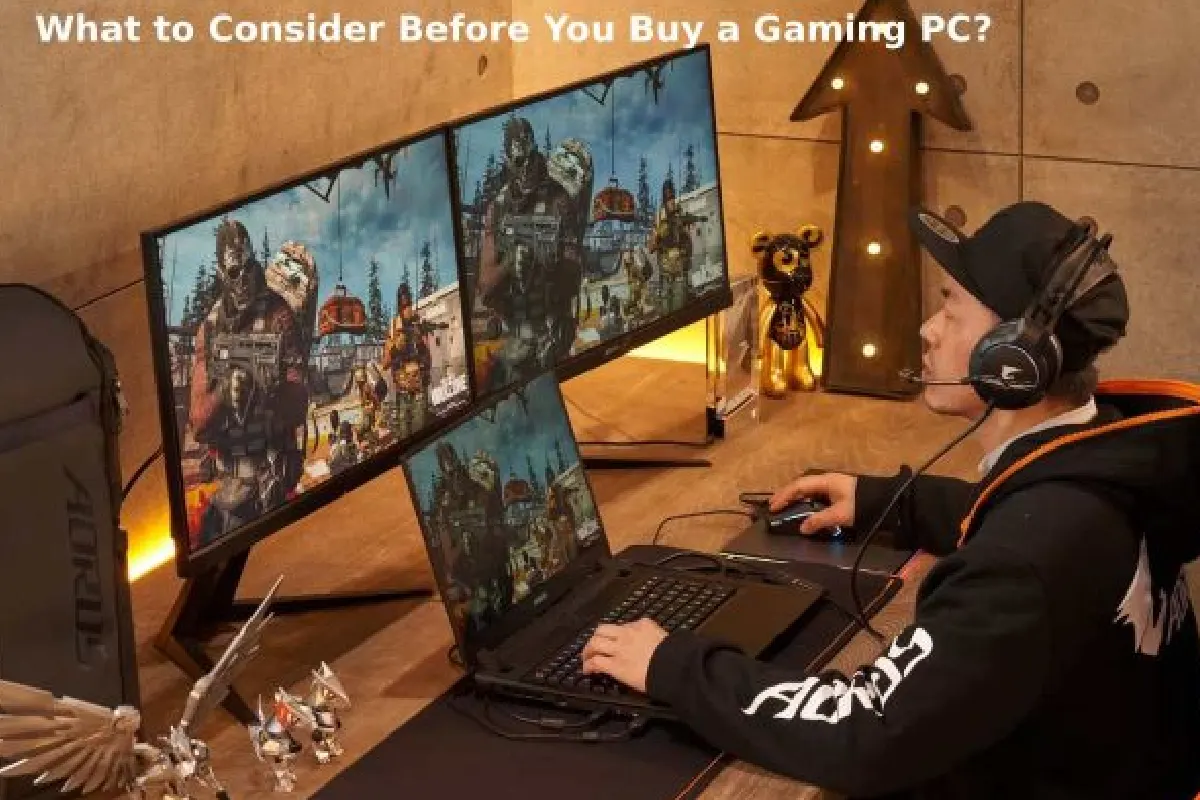Introduction
Buy a Gaming PC – Buying a dedicated PC for playing video games used to be something that only the super-rich could afford to do. But the good news is that these days, the demand for great gaming PCs has sent them into the mainstream, so if you want to start playing more PC games there’s no need to set out to build your own and spend a ton of money on all the different components. There are lots of pre-build gaming PCs on the market just ready for you to unbox, set up, and start enjoying. However, before you start shopping, here are some of the main things to think about.
What is a Gaming PC?
At its heart, a gaming PC is just a PC, but it’s not like most other computers. While the normal PC can run office-based software, cruise the internet, and allow for basic picture or video deletion, a typical PC can’t run more than modest games at low resolutions. If you want to play today’s level of fun on your PC, it’s important to pick out a gaming system with keen hardware for gaming drives. While a regular PC may run some straightforward or older games, you need a devoted graphics card and more powerful hardware to produce the newest titles. Today’s top-tier games are amongst the most computationally complex tasks a computer can do.
5 Gaming PC Specs to Consider Once Buying a Gaming PC

There are some key factors to keep in mind that differ from buying a regular PC. As you look at gaming PCs, you’ll see they all offer different specifications and features.
It’s essential to get a balanced gaming PC, from ensuring you have the best storage for your gaming PC to getting the right specs for your needs. Here are the five key areas you need to think about before you capitalize on a new gaming PC:
- Cost
- Graphics Card
- Process/RAM
- Hard Drive
- Out of the box or custom?
What Components Do You Look for When Buying a Gaming PC?
When choosing a gaming computer, consider the following components.
Processor
Ideally, the minimum central processing unit (CPU) specification would be the latest generation model. You can get away with an older iteration for PC games with less detail and slower action. However, you’ll need a new processor with more power for demanding games.
Video graphics Card
For best results, consider buying a separate video graphics card from the one already installed on your computer. If you’re playing at high definition (HD) 1080p at 60 frames per second (fps), a midrange graphics card is adequate, but if you’re playing 4K video at 120 fps, you’ll need a higher quality GPU.
RAM
Random-access memory, or RAM, acts as a buffer during intense processing. The minimum amount for gaming is 8 GB, but 16 GB is best. 32 GB is more than enough and comes in handy if you multitask.
Cooling
Heat is a gaming PC’s enemy. A flat-out processor generates a lot of heat thanks to the complex components that provide high-tech features. An overheated processor may slow your game unless you take steps to cool down your computer. The best cooling solutions to look for include extra CPU case fans, heat sinks, and water cooling kits for gaming PCs.
Monitors
Because gaming needs fast response times, look for a monitor with a refresh time of 5 milliseconds or less. High-definition (HD or 1080p) gaming monitors offer good performance, while 1440p and ultrahigh definition (UHD) 4K monitors give the best clarity. Even with the optimal monitor, you’ll probably still need a high-end graphics card to prevent visual lagging. The same applies if you want to use multiple monitors.
Appearance
Gaming PCs often include special effects that enhance their appearance. These include transparent sides with interior lighting, multi-colored cables, and internal color coordination. Backlit peripherals feature colored highlights and laptop housings with innovative designs.
Desktop Versus Laptop Gaming Computers

Gamers often wonder what the best gaming PC is on the market today. Many gamers consider desktops the best for gaming, but gaming laptops have come a long way, with top models offering comparable performance and portability.
Since the design is compact but powerful, a gaming laptop offers a good value for the money. The only extras you need are a mouse and peripherals. Many have solid-state drives (SSDs), so they boot up quickly. Gaming laptops have an attractive design and special keyboards with WASD function keys. However, upgrading components except for RAM is generally impossible, which is why many gaming enthusiasts opt for the desktop versions.
Gaming Accessories
Whether you buy a gaming desktop or a gaming laptop, you must purchase gaming accessories such as a gaming mouse, headset, and other peripherals. Before shopping, always check compatibility for the best performance.
Gaming Keyboard
A gaming keyboard includes full-sized, strategically spaced keys for increased comfort during long gaming sessions. Many models have mechanical keys, which make a haptic click sound when activated. They are also easier to press and don’t need as much force. Good gaming keyboards have a row or two of programmable keys that you can customize for your favorite games. Another popular feature of gaming keyboards is backlighting. Not only does it look cool and make gaming more fun, but it also allows you to game in all types of lighting. A backlit keyboard is a must if you’re one of the many gamers who like to turn off the lights and play in the dark.
Gaming Mouse
A gaming mouse has adjustable sensitivity, so you can set cursor movement to suit your game. Some also have additional keys you can configure for special actions. Like gaming keyboards, many mice include haptic sounds and lights that make it easier to play in the dark.
Gaming Mousepad
Gaming mousepads are often larger than standard pads to allow a greater range of movement. Made of high-quality, durable materials, they have a tightly woven, smooth surface that will enable you to control cursor movement precisely.
Headset
Gaming headsets incorporate a microphone to allow you to communicate with other companies in multiplayer games. Their improved sound qualities let you detect subtle sounds that may make the difference between success or failure on a mission.
Type of PC
The first thing to think about is the type of PC you need and the components it will be using. For example, it’s worth finding out what kind of graphics card the PC has if you want to use it with an existing monitor. If you are looking at PCs with Intel Arc Graphics, for example, then make sure that you are playing games that it is compatible with – especially if you enjoy playing a lot of graphics-heavy games like PUBG or The Witcher 3.
Price

Before you start shopping for your new gaming PC, it’s worth having a budget in mind as PCs are available at all price points these days. Consider how much you are willing to spend and what you need the most from your gaming PC in order to find options that are not only suitable for your requirements but also for your budget. Don’t forget to also factor in the cost of any peripherals and accessories that you might need for your gaming PC such as monitors, headsets, a gaming keyboard and mouse, speakers, and more.
Customization
Another factor that you may want to consider before you decide on a gaming PC to buy is how easy it is going to be to customise your PC in the future. While buying a pre-built gaming PC might make more sense than building your own in many situations, there’s always the chance that in the future you may want or need a more powerful processor, graphics card, or more RAM for example. Think about how easy it will be for you to get inside the PC, remove the old components and upgrade them to new ones if you want to.
Guarantees and Warranties
A major benefit of buying a pre-built gaming PC is that there will often be a warranty that covers the entire PC, rather than having separate ones to cover the different components. If you are looking to buy a pre-built gaming PC, then be sure to check out the warranties available and choose one that lasts a decent amount of time and covers you for anything that might go wrong, including both repairs to the PC, replacement of components, or replacement of the entire PC.
Today, buying a pre-built gaming PC can be a cheaper and more convenient alternative to building one. But before you get started, keep these factors in mind to help you make the best choice.
Conclusion
A gaming PC is one of the best habits to enjoy the latest games with high determination and fantastic visual quality. With so many brands and riders to consider, knowing where to start is hard. This procurement guide will help you determine which betting PC to buy based on your needs, budget, and tastes. PC used to be only for people with more money than time (or sense), but times have changed. Prices have come down to the point where building your own does save you as much as it once did. Even if you pay a premium, you get perquisites like support, warranties, and discounts by buying prebuilt. But before you whip out a credit card, here are some things you should consider first to ensure prebuilt is right for you.
Also Read: Commercial Loan Truerate Services


